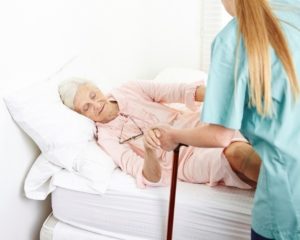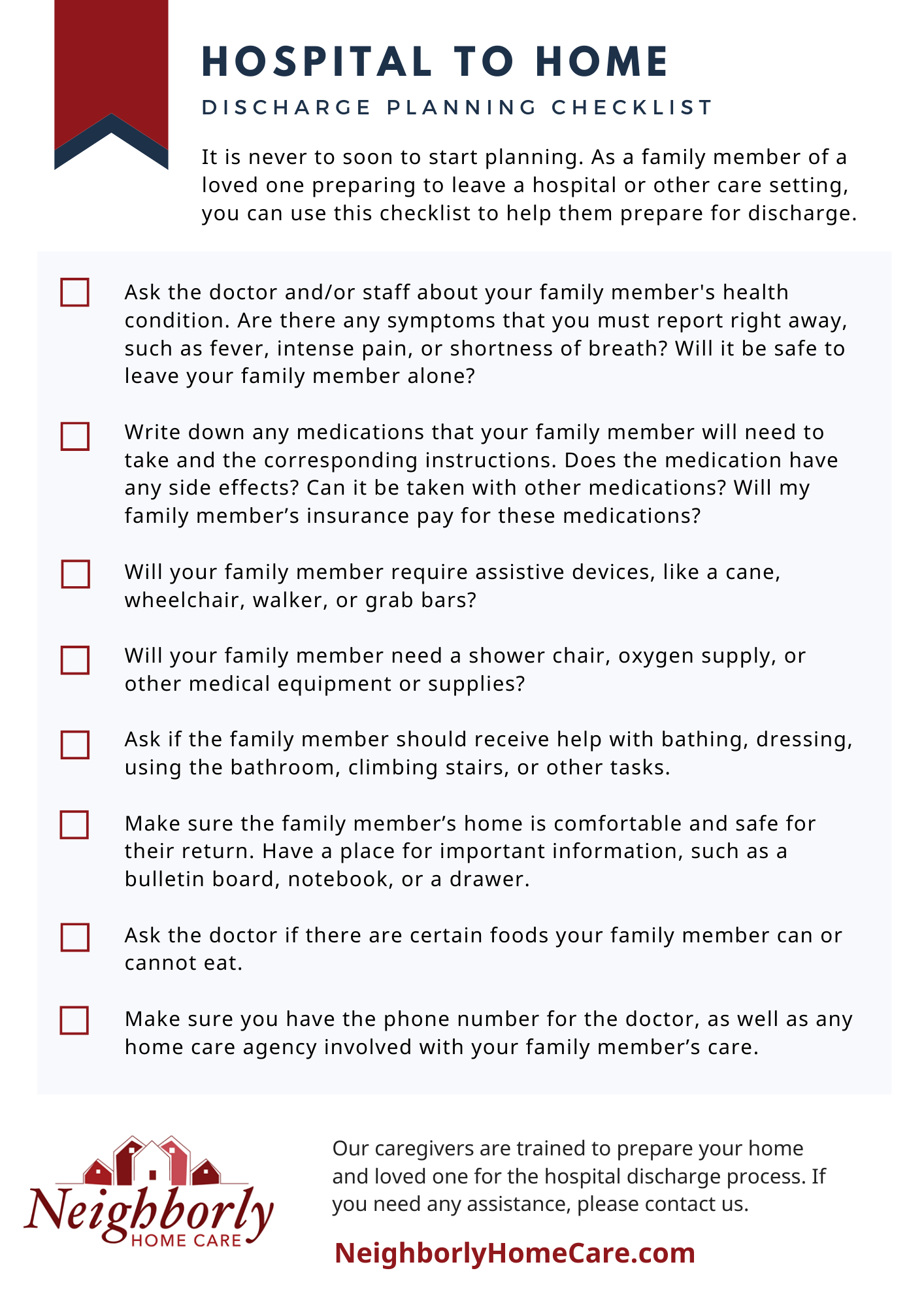Planning for Senior Care After A Hospital Discharge
 Early preparation is vital to senior care after a hospital discharge. If you have an elderly loved one about to be discharged, anticipate their post-hospitalization needs. Hospitalization can be disorienting for anyone, and seniors may find regaining their independence particularly challenging. By preparing in advance, you can make a smooth transition from the hospital and aid in their full recovery. Below are essential elements of a post-hospital care plan.
Early preparation is vital to senior care after a hospital discharge. If you have an elderly loved one about to be discharged, anticipate their post-hospitalization needs. Hospitalization can be disorienting for anyone, and seniors may find regaining their independence particularly challenging. By preparing in advance, you can make a smooth transition from the hospital and aid in their full recovery. Below are essential elements of a post-hospital care plan.
Medical-related senior care
Communication with your loved one’s doctor is paramount before their discharge. This conversation will provide critical insights into the type of post-hospital care needed, any activity or dietary restrictions, and other lifestyle adjustments. Other essential questions to ask are about potential warning signs of relapse. Gathering this information will help you prepare effectively for their care at home.
Also, gather information about any medications your loved ones may be taking, including medication schedules and whether you need to know about any food or drug interactions to avoid. If you will be sharing duties with other family caregivers, share this medication management information with them to ensure everyone is on the same page and to minimize any possible medication issues.
Assistive technologies
Another primary consideration is whether you and your loved ones will need any devices to help with senior care after a hospital discharge at home. For example, you may need to install safety rails on the bathtub. When a senior requires the use of mobility aids, such as a walker or a wheelchair, you should make sure there will be plenty of room within their home for these devices. Below are some examples of assistive devices you may need to consider when caring for seniors:
Mobility Aids
- Canes
- Walkers
- Wheelchairs
- Grab bars
- Shower chairs
Daily Living Aids
- Reacher grabbers
- Sock aids
- Dressing sticks
- Elevated toilet seats
- Bathing benches
Along the same lines, be informed about whether your loved ones will come home with any medical equipment, such as oxygen tanks or health monitors. Be sure you understand what they will have and how those devices operate. This understanding will make you feel informed and prepared for their care at home.
Lifestyle assistance
Contact Us
Are you a Home Care Worker?
Free Dementia FAQs eBook
The families we serve keep saying great things.
I just wanted to tell you how grateful we are that Neighborly Home Care stepped in & took over taking care of my Dad when we really needed it, no questions asked. Our caregiver has become part of the family and we know we can depend on her being there every day & taking great care of my Dad. He misses her when she’s not there!
— Daughter of an NHC Client
Depending on the situation, your loved one may need extra help, at least at first, in their day-to-day life. Here are some of the most common areas where they may need assistance:
- Meal preparation: Seniors may be too tired or weak to prepare proper meals after a hospital discharge, but seniors still need proper nutrition post-hospitalization. Be sure your loved ones have a source of well-balanced meals.
- Personal hygiene: When mobility issues exist, bathing and similar activities may be challenging, but hygiene is essential for a speedy and healthy recovery.
- Everyday chores: Your loved ones may be unable to do tasks such as housekeeping or dishwashing. Be willing to pitch in with these daily activities.
Coordinate with Other Family Caregivers
Coordinating and sharing caregiving duties among family members is essential for effective medical care for a senior after a hospital discharge. Here are some tips for coordinating and sharing caregiving responsibilities:
- Schedule Regular Family Meetings: Establish regular family meetings to discuss the caregiving plan and any updates regarding the senior’s condition. These meetings allow family members to share concerns, coordinate schedules, and address challenges.
- Create a Caregiving Schedule: Develop a caregiving schedule that outlines each family member’s responsibilities, including tasks such as medication management, meal preparation, transportation to medical appointments, and providing companionship. A clear care plan and schedule can help ensure that all necessary tasks are covered and no one feels overwhelmed by the responsibilities.
- Use Technology to Coordinate: Utilize shared calendars, messaging apps, or caregiving management platforms to keep everyone informed and coordinated. This can help family members stay updated on the senior’s needs, appointments, and any changes to the caregiving schedule.
- Delegate Based on Strengths and Availability: Assign tasks based on each family member’s strengths and availability. For example, a family member who is good at meal planning and preparation could take on cooking duties. At the same time, someone with a flexible work schedule could assist with transportation to medical appointments.
- Consider Professional Caregiver Assistance: If the caregiving responsibilities are extensive, consider hiring professional caregiver assistance to provide additional support. Professional caregivers can help fill in gaps in the family’s caregiving schedule and provide specialized care for seniors’ needs.

By implementing these strategies, family members can work together effectively to provide comprehensive and compassionate care for their loved ones after a hospital discharge.
Emotional Support for Seniors After Hospital Discharge
Providing emotional support to seniors after a hospital discharge is crucial for their well-being and recovery. Here are some ways to offer emotional support to elderly loved ones:
- Open Communication: Encourage open and honest communication with your loved one. Allow them to express their fears, concerns, and any emotional challenges. Listen attentively and offer reassurance and understanding.
- Offer Companionship: Spending quality time with your loved one can help alleviate loneliness and isolation. Engage in activities they enjoy and provide companionship to boost their spirits.
- Encourage Independence: While support is essential, allowing independence is equally vital. Help them regain a sense of autonomy by allowing them to make decisions and participate in activities to the best of their ability.
- Address Anxiety and Depression: Hospitalization and the subsequent transition process and recovery period can lead to feelings of anxiety and depression. Look for signs of emotional distress and seek professional help if necessary.
- Maintain a Positive Environment: Create an uplifting and safe environment at home. Surround your loved one with items that bring them joy, such as photos, favorite books, or music.
- Seek Support Groups: Encourage your loved one to join support groups or engage in social activities with peers who may be going through similar experiences. Connecting with others can provide a sense of belonging and emotional support.
Incorporating these emotional support strategies into your caregiving plan can help your loved one navigate the emotional challenges of post-hospital care with comfort and reassurance.
Neighborly Home Care Is Available For Senior Care After a Hospital Discharge
We are a trusted home care assistance agency in Pennsylvania and Delaware, and have some of the strictest hiring standards in the region. We work to help seniors be happy and healthy in their homes while assisting as needed. Our care agency provides transportation to and from the hospital and whatever level of assistance may be needed to support the recovery process and overall senior care after a hospital discharge. Contact us to learn more about our senior care solutions.